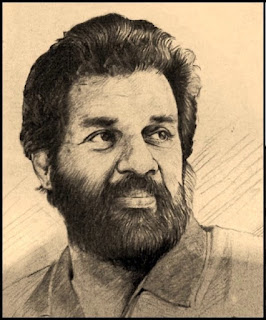If we know
of a man for all seasons, and a man of many parts, then we can also begin to
appreciate India's singer for all seasons, Padma Vibhushan K.J. Yesudas.
To give a perspective of his achievements, let us see Wikipedia:
Kattassery Joseph Yesudas (born 10 January
1940) is an Indian playback singer and musician who sings Indian classical,
devotional and film songs. He is widely regarded as one of the greatest
singers in the history of Indian Music and also as a cultural icon. Yesudas is
estimated to have recorded more than 50,000 songs in various Indian languages,
including Malayalam, Tamil, Kannada, Telugu, Hindi, Odia, Bengali, Marathi as
well as Arabic, English, Latin, and Russian, in a career spanning six decades. He
is often referred to as Gaana Gandharvan (transl. The Celestial Singer).
Yesudas won the National Award for the Best
Male Playback Singer a record eight times, the Filmfare Awards South five times,
and the State Award for the Best Playback Singer forty-three times, including
awards given by the state governments of Kerala, Tamil Nadu, Andhra Pradesh,
Karnataka, and West Bengal. He received the Padma Vibhushan (the second-highest civilian
award) in 2017 from the Government of India for his contributions to the
arts.
Yesudas started his academic music training at
R. L. V. Music Academy, Thrippunithura, and completed the Ganabooshanam course.
Later he studied at Swathi Thirunal College of Music, Thiruvananthapuram under
the tutelage of the Carnatic music maestro K. R. Kumaraswamy Iyer and the doyen
Semmangudi Srinivasa Iyer but could not complete his studies due to financial
constraints. For a brief period, he also studied music under Vechoor Harihara
Subramania Iyer, after which he took advanced training from Chembai Vaidyanatha
Bhagavatar.
We have
featured several concerts performed at the home of Parvathi over 5 decades by
Vid. Yesudas. He shares a unique chemistry with Sri. K. Srikantiah, and has come more readily to perform in Parvathi than even at the Mysore Palace Dasara.
In this
concert, Sri. Yesudas is accompanied by two Sangeetha Kalanidhis who have made
and continue to make our lives richer through their music – Vid. M.
Chandrasekharan on the violin and Vid. T. V. Gopalakrishnan on the mridangam.
There is also ghatam accompaniment by Vid. T.V. Vasan and khanjira accompaniment
by Vid. H.P. Ramachar. Sri. Yesudas sings in three octaves with ease, and
negotiates a plethora of rich ragas and famous compositions of the great
Vaggeyakaras, and gives nearly an hour of his popular film songs that draws huge applause.
Hindolam is very well presented. Then, there is a consummate presentation of Kharaharapriya and the famous Thyagaraja song Pakkala Nilabadi.
As the Vidwan begins the alapana of Shankarabharanam, an idea strikes me. The most common scale in the world of music is this raga, also called C Major or the Ionian mode. In fact, this raga is the most natural scale offering a harmonic relationship between any two notes.
True to its name- which
means Lord Shiva’s ornament, Shankarabharanam accommodates many different
interpretations, just as Lord Shiva has three ornaments - the crescent moon in his crest, the cascading Ganga down his matted locks, and snakes all over. Shankarabharanam has Carnatic gems of Krithis like Akshayalingavibho and Swara Raga Sudha, as also the currently hugely popular, child-friendly, Nottuswarams. These are like the splendid moon on Shiva’s crest. Then the raga allows for expansive, fluid, and evocative alapanas and Tanams (listen to Vid. Yesudas here!). They are like the Ganga cascading down Shiva’s matted locks! Finally, Western/ Jazz/ Rock/Heavy metal interpretations are also hugely popular. They are a bit like the fascinating snakes that coil
and slither all over the Lord's body! What a gift of music is Shankarabharanam from Lord Shiva to us all,
irrespective of our tastes!
The reason
for featuring this concert in the Parvathi finale is simple – the December
Music Season may come and go, but Gaana Gandharvan Vid. Yesudas will thrill any
listener in any season, and this concert is precious proof of that!
during Ramanavami Festival, "Parvathi", Mysore, April 1977.
Song list:
1. Evari Bodha – Abhogi varnam – Patnam
Subrahmanya Iyer
2. Siddhi Vinayakam – Chamaram
(Shanmukhapriya) – Muthuswami Dikshitar
3. Pavanaguru-Pavanapuraadheesham
Aashraye – Hamsanandi – Swathi Thirunal
4. Govardhana Girisham – Hindolam –
Muthuswami Dikshitar
5. Pakkala Nilabadi – Kharaharapriya –Thyagaraja
6. Manavyalakimcha radate-
Nalinakanthi- Thyagaraja
7. Adhiye Paranjyothiye –
Narayanagowla? – Vedanayagam Pillai
8. Shankarabharanam alapana
9. Tanam with mridangam accompaniment
10. Enduku Peddala Vale – Shankarabharanam –
Thyagaraja
11. Thirupar Kadalil Pallikondaye –
Bhairavi - Vayalar
12. Harivarasanam – Madhyamavati –
Dakshinamurthy
13. Chand Akela Jaye Sakhi Ri
14. Apoorva Ragam
15. Jab Deep Jale Aana
16. Murugane Kaana Aaayiram Kann Vendum
17. Ni Sa Ga Ma Pa Ni
18. Shloka – Bhimplas, Anandabhairavi
19. Mangala Darshana Dayike – Ananda
Bhairavi
20. Yogeendraanaam – Ragamalika (Kapi,
Sindhubhairavi) – Narayaneeyam
21. Mangalam





